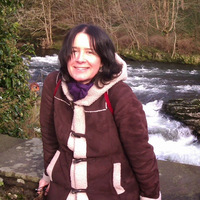
Endre Dányi
I'm Professor for the Sociology of Globalisation at the University of the Bundeswehr in Munich. I'm also University Fellow at the Northern Institute at the Charles Darwin University, Australia, and co-editor of an Open Access book publisher called Mattering Press.
less
Related Authors
Aliya Kuzhabekova
University of Calgary
Richard Pitt
University of California, San Diego
Gijsbert Hoogendoorn
University of Johannesburg, South Africa
Barbara Poggio
University of Trento
Annalisa Murgia
Università degli Studi di Milano - State University of Milan (Italy)
Michele Jacobsen
University of Calgary
Caroline Newton
TU Delft
InterestsView All (30)








Uploads
Books by Endre Dányi
Papers by Endre Dányi
Drawing on the insights of Foucauldian governmentality studies and Actor-Network Theory, this paper focuses on drug use as a problem in its spatial-material settings. Based on ethnographic fieldwork, our contribution traces multiple problematisation processes and related infrastructures.
From the needle exchange programme’s perspective, drug use is not a singular problem but the effect of multiple problematisation processes. Although those processes are often in conflict with each other, the question is not which one is right, but how social workers manage to hold them together. It is a fragile achievement that requires years of training and ongoing negotiation with local actors. By eliminating Kék Pont’s 8th district office, the Hungarian Government did not only hinder harm reduction in the area; it had also rendered tacit knowledges associated with the needle exchange programme as a ‘drug place’ inaccessible.
Our paper is a melancholy intervention – an attempt to preserve tacit knowledges that had accumulated at the needle exchange programme. Our retelling of ethnographic stories about this ‘drug place’ is our way of ensuring that other drug policies remain imaginable.
Drawing on the insights of Foucauldian governmentality studies and Actor-Network Theory, this paper focuses on drug use as a problem in its spatial-material settings. Based on ethnographic fieldwork, our contribution traces multiple problematisation processes and related infrastructures.
From the needle exchange programme’s perspective, drug use is not a singular problem but the effect of multiple problematisation processes. Although those processes are often in conflict with each other, the question is not which one is right, but how social workers manage to hold them together. It is a fragile achievement that requires years of training and ongoing negotiation with local actors. By eliminating Kék Pont’s 8th district office, the Hungarian Government did not only hinder harm reduction in the area; it had also rendered tacit knowledges associated with the needle exchange programme as a ‘drug place’ inaccessible.
Our paper is a melancholy intervention – an attempt to preserve tacit knowledges that had accumulated at the needle exchange programme. Our retelling of ethnographic stories about this ‘drug place’ is our way of ensuring that other drug policies remain imaginable.
This concern with the state of critique at a time when normative and political utopias are no longer considered to be relevant, is also a concern for Performing the State project and is at the core of Endre Dányi’s most recent research on melancholy politics. The questions that preoccupy him are centred around the ways in which politics-in-practice can be studied at a time when liberal democracy is being hijacked and /or claimed to be outdated by some of the most powerful players in international politics. More specifically, he asks: How might researcher-citizens deal with complex political challenges, such as the recent refugee crisis in Europe, which raise not only ideological but also political theoretical dilemmas vis-a-vis the modern state? How can they relate to such ambiguous public problems as drug use, which seem to defy national attempts to govern through legislation? And how might they even begin to conceptualise the concurrent practice of differing modes of the political, as is being called for by many indigenous groups? Do these and similar moments indicate the end of democratic politics as we know it?
What follows is a shortened version of the conversation we had about these and related questions after the Values of Critique symposium.
All three stories come from my recently completed PhD thesis, which is a material-semiotic analysis of the Parliament in Hungary – a country where democracy is said to have begun after the fall of communism in 1989. Indeed, my first story leads straight back to the first democratic election in 1990, in which the Alliance of Free Democrats (AFD) – a liberal party that is often portrayed as the movement that initiated the regime change in Hungary – came second behind the conservatives, gaining 24.09% of the seats in the new National Assembly. Four years later, with 17.62% of the seats, the liberals retained their second position, despite the fact that by then the conservatives lost most of their support, and decided to form a coalition government with the Hungarian Socialist Party (HSP), which received more than half of the votes in the second democratic election. Whether it was the difficult economic situation of post-communist Hungary or the political scandals of the first liberal-socialist coalition that then led to the dramatic loss of popularity of the AFD is difficult to tell. What is certain is that in the third democratic election the liberal party barely crossed the 5% threshold required to make it into the parliament, and so it became one of the smallest parties in the National Assembly. After 1998, the liberals could not break out of the small party status: both in 2002 and in 2006 they received only 5.18% of the mandates. This allowed them to form another governing coalition with the socialists, but also made them look like the little brother of the HSP with no will of its own.
Just how frustrating this little brother position must have been for the liberals becomes clear in my second story, which is about the AFD’s attempt to liberalise the Hungarian healthcare system. Healthcare was regarded as one of the symbolic issues of the second liberal-socialist coalition, and so from the beginning of the 2006-2010 term the conservatives did whatever they could to undermine all healthcare-related initiatives. In the end of 2007, when the government’s new healthcare bill was passed by the National Assembly, the opposition called for a referendum, arguing that it was the people’s right to decide whether they wanted to pay daily hospital fees and consultation fees, or preferred the healthcare system to remain publicly funded. The outcome of the referendum, which took place on the 9th March 2008, was devastating for the government: 84.08% of the people voted against the daily hospital fees and 82.22% against the consultation fees. As a result, the socialist Prime Minister announced the withdrawal of the new healthcare law, and – adding insult to injury – on the 31st March 2008 unilaterally sacked the liberal Minister of Health, blaming entirely her and her party for the failed reform.
As if the result of the referendum and the sacking of their key minister were not enough trouble for the liberals, in the end of March 2008 a large commercial opinion poll company published a report, according to which the popularity of the AFD among Hungarian voters was not higher than 1% – the worst result since the regime change in 1990. My third story is about this report, and the liberal politicians’ bitter realisation that if they wanted to stand any chance in the 2010 election, their party had to be urgently repositioned in the political market. This had to be achieved by making liberal politics more distinguishable from the politics of the socialists, and by convincing liberal voters that the AFD was still the only true representative of liberal politics in Hungary. The first part of the dual task went well: a month after the publication of the survey report the AFD officially quit the second liberal-socialist coalition. The second part of the dual task did not go well at all: in the 2010 the liberal party could not make it into the parliament, and soon after the election became an insignificant political entity.
These three stories about a series of elections, a referendum, and an opinion poll could be easily read as three moderately interesting episodes from the political history of post-communist Hungary. My intention in this paper, however, is to advocate another reading – one that focuses on the multiplicity of numbers on the one hand, and the political implications of that multiplicity on the other. The first and the second story are obviously different. The first is about a people that exercises its sovereign rights through elected representatives, no matter what issue is at stake, while the second is about a people that is expected to make decisions about various issues, no matter who is in government. What a closer look at the numbers, more precisely at the logic of enumeration, associated with elections and referenda indicates, however, is that these two stories are also quite similar: both are about counting heads, that is, calculating the percentage of certain individuals within a political community. It is this similarity that makes the logic of enumeration presented in the third story look radically different. Unlike elections and referenda, opinion polls are about cutting heads: they are predictions about which parties and politicians are likely to fall from power in the near future. As such, what they take for granted (and thus help to perform) is not a people but a political market, where political participation is limited to discreet acts of voting. By juxtaposing counting heads and cutting heads as distinct logics of enumeration, the purpose of this paper is not to critique political markets per se, but to articulate the possibility of doing politics beyond the reality of markets, within democracy.
The lecture is part of Modul 1422 “Macht-Herrschaft-Gesellschaft”, and is offered as double sessions between the 6th May and the 3rd June 2019. The successful completion of the course requires regular attendance and active participation in the group exercises. Detailed information about the individual lectures, including literature and background material, is available on Canvas.
The course is divided into two parts. In the first part, we discuss a set of readings which exhibit a variety ways scholars have figured differences of the West and its ‘others’ as studies of cosmopolitics. Each reading forwards a particular proposition around this topic, and in the process of doing so also generates resources that can be drawn on by other scholars. In the second part of the course, we consider how we might use these resources in our own empirical works in the Northern Territory in Australia, which are parts of an ongoing collaboration between the Department of Sociology at the Goethe University in Frankfurt and the Northern Institute at the Charles Darwin University in Darwin. More specifically, we collectively explore the possibilities of generating a cosmopolitical sensitivity at a time when the capacities of mainstream western political practices to deal with differences within and beyond their own framing appear increasingly limited.
We would love to see proposals that enrich and complicate what it means to “make” and “do” in times of massive environmental degradation and anthropogenic climate change. Expanding on Making & Doing itself, what might it mean to “make do”—that is, to challenge the modernist belief in a Technoscientific Fix and the neoliberal fallacy that more is always better? What might it mean to “make do” in New Orleans, a site that grounds us all in both vibrant and brutal histories and futurities?
To address these questions, we invite 4S members to present experimental works in any medium that engage speculative, empirical, reflexive and/or aesthetic approaches to the study of science and technology, broadly defined. Works might take the form of sonic ethnographies, experimental videos, diagrams, interactive games, durational performances (by humans or other species), virtual/augmented reality applications, immersive projections, cooking demos, or other interventions, mundane patches, and critical apparatuses that exceed the printed page.
We look forward to your proposals and provocations!
Endre Dányi, Elaine Gan, Jen Henderson
Organizing Committee for Making & Doing